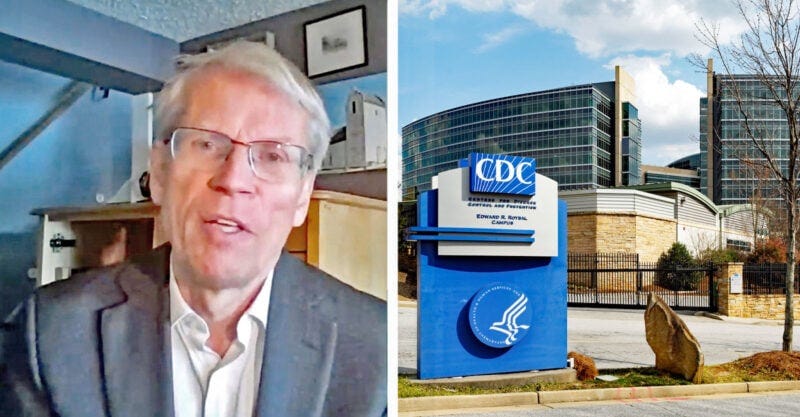CDC Advisory Committee Vows to Study Cumulative Effect of Childhood Vaccine Schedule
“The number of vaccines that our children and adolescents receive today exceeds what children in most other developed nations receive..."
This article originally appeared on The Defender and was republished with permission.
Guest post by Suzanne Burdick, Ph.D.
The CDC’s advisory committee began its two-day meeting yesterday despite a call from Sen. Bill Cassidy late Monday to delay it. Martin Kulldorff, Ph.D., the committee’s new co-chair, opened the meeting by reassuring the public that the committee members will use “evidence-based medicine” to make vaccine recommendations.
The CDC’s new advisory committee today announced plans to look at the cumulative effect of all vaccines given during childhood.
Martin Kulldorff, Ph.D., the committee’s new co-chair, said:
“The number of vaccines that our children and adolescents receive today exceeds what children in most other developed nations receive — and what most of us in this room received when we were children.
“In addition to studying and evaluating individual vaccines, it is important to evaluate the cumulative effect of the recommended vaccine schedule. This includes interaction effects between different vaccines, the total number of vaccines, cumulative amounts of vaccine ingredients, and relative timing of different vaccines.”
A new committee work group will look into these issues, Kulldorff said. The Centers for Disease Control and Prevention currently recommends at least 70 doses of 15 different vaccines for children and adolescents up to age 18.
#ad: Your diet isn’t perfect—and that’s okay.
Global Healing’s Organic Multivitamin is here to help you fill the gaps with over 30 essential vitamins and minerals your body needs to feel its best.
There are no coatings, no fillers—just clean, high-quality nutrients your body can actually use. It’s a simple, effective way to support your daily health and give your body the care it deserves.
Experience the difference you can actually feel. Use code VFOX at checkout for 10% off your order.
DISCLOSURE: This is an affiliate link. I may earn a commission if you make a purchase here, at no additional cost to you.
Another new work group will look at vaccines that have not been subject to reviewed in more than seven years, he added. “This was supposed to be a regular practice of the ACIP, but it has not been done in a thorough and systematic way. We will change that.”
ACIP began its two-day meeting today despite a call from Sen. Bill Cassidy (R-La.) late Monday to delay the meeting until the committee “is fully staffed with more robust and balanced representation.”
On June 11, U.S. Health and Human Services (HHS) Secretary Robert F. Kennedy Jr. named eight researchers and physicians to the Centers for Disease Control and Prevention’s (CDC) vaccine advisory panel, two days after removing all 17 ACIP sitting members.
However, according to The New York Times, one of the new members, Dr. Michael A. Ross, a physician licensed in Virginia and a former professor of obstetrics and gynecology, withdrew from the committee.
Kennedy reconstituted the committee to “avoid conflicts of interest,” citing past members’ financial ties to pharmaceutical companies, he said in a Wall Street Journal op-ed about the change.
According to Cassidy, although the new committee members “have scientific credentials, many do not have significant experience studying microbiology, epidemiology or immunology. In particular, some lack experience studying new technologies such as mRNA vaccines, and may even have a preconceived bias against them.”
In addition to Kulldorff and Ross, the other six new members tapped by Kennedy are:
Dr. Joseph R. Hibbeln, a psychiatrist and neuroscientist with a career in clinical research, public health policy and federal service.
Retsef Levi, Ph.D., a professor of operations management at the MIT Sloan School of Management and a leading expert in healthcare analytics, risk management and vaccine safety.
Dr. Robert Malone, a physician-scientist and biochemist known for his early contributions to mRNA vaccine technology.
Dr. Cody Meissner, a professor of pediatrics at the Geisel School of Medicine at Dartmouth and a nationally recognized expert in pediatric infectious diseases and vaccine policy.
Dr. James Pagano, a board-certified emergency medicine physician with over 40 years of clinical experience following his residency at UCLA.
Vicky Pebsworth, Ph.D., a registered nurse who holds a doctorate in public health and nursing from the University of Michigan.
New committee members will use ‘evidence-based medicine’
Kulldorff opened this morning’s meeting by reassuring the public that the committee members will use “evidence-based medicine” to make vaccine recommendations.
“Vaccines are not all good or bad,” Kulldorff said. The labels pro-vaccine and anti-vaccine “undermine scientific inquiry.”
Caring about vaccine safety doesn’t make one anti-vaccine, Kulldorff said. “In fact, to thoroughly scrutinize and ensure the safety and efficacy of vaccines is a pro-vaccine position, just like the promotion of aviation safety is a pro-airline position.”
Meanwhile, the American Academy of Pediatrics (AAP) today denounced the new committee in an X post, saying AAP will issue its own childhood immunization schedule rather than accept recommendations made by the new ACIP committee members.
According to the AAP’s website, the organization receives annual contributions of over $50,000 from numerous pharmaceutical companies, including Merck, Sanofi and Moderna.
Committee will reconsider Hep. B vaccine recommendation, timing of MMR vaccine
Today’s ACIP meeting includes presentations on the COVID-19 vaccines, updates from HHS agencies, and a vote on RSV vaccines for babies and young children.
The committee will also vote on whether to include RSV vaccines in the federal Vaccines for Children Program. An earlier agenda draft included a vote on the RSV vaccine for pregnant women. However, that vote was dropped from the final agenda.
Tomorrow, the committee will hear presentations on other vaccines, including flu, chikungunya, anthrax and MMRV (measles, mumps, rubella, varicella). Votes are scheduled for flu vaccines and thimerosal-containing flu vaccines. Thimerosal is a form of mercury.
Kulldorff also announced that future work groups will reconsider other vaccine recommendations, including the universal hepatitis B recommendation.
He said:
“Is it wise to administer a birth dose of Hepatitis B vaccine to every newborn before leaving the hospital? That’s the question. Unless the mother is hepatitis B positive, an argument could be made to delay the vaccine for this infection, which is primarily spread by sexual activity and intravenous drug use.”
The committee also plans to create a work group to review the most recent research on vaccinating against measles, Kulldorff said. The work group may reconsider giving the MMRV to 1-year-olds and rethink the timing of the MMR vaccine.
HHS responds to Cassidy’s concerns over CDC’s vaccine committee
When asked to comment on Cassidy’s call for a delay, HHS Press Secretary Emily G. Hilliard said the ACIP meeting would take place as scheduled.
Hilliard pushed back against Cassidy’s claim that the new committee members would be unable to perform their task, saying:
“The new ACIP committee is committed to evidence-based medicine, gold-standard science, and common sense. The ACIP meeting will take place as scheduled. To be clear, the Secretary said he will maintain the Centers for Disease Control and Prevention’s Advisory Committee on Immunization Practices recommendations without changes.”
Watch ACIP’s live meeting below:
Day 1:
Day 2:




